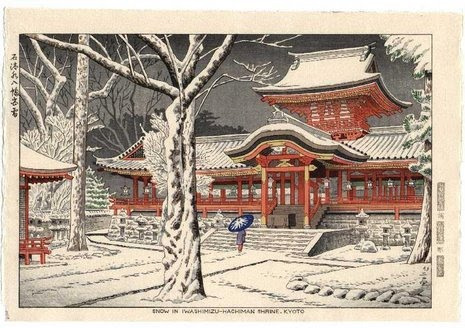
things directly. Unlike things and their reflections in the mirror, and unlike the moon
and its reflection in the water, when one side is illuminated the other side is dark.
To study the buddha way is to study the self. To study the self is to forget the
self. To forget the self is to be actualized by myriad things. When actualized by
myriad things, your body and mind as well as the bodies and minds of others drop
away. No trace of realization remains, and this no-trace continues endlessly.
When you first seek dharma, you imagine you are far away from its environs.
But dharma is already correctly transmitted; you are immediately your original self.
When you ride in a boat and watch the shore, you might assume that the shore
is moving. But when you keep your eyes closely on the boat, you can see that the boat
moves. Similarly, if you examine myriad things with a confused body and mind you
might suppose that your mind and nature are permanent. When you practice
intimately and return to where you are, it will be clear that nothing at all has
unchanging self.
What is it to fully engage body and mind? Can we do it self consciously? No! Fully engaging body and mind is to add no extra thoughts to the situation. This is called Samadhi. Usually Samadhi is defined as one pointed concentration but I think it is better defined as engagement without thought of self. This can happen in all sorts of activities, athletics, sports, meditation, even intellectual endeavors. It can happen in the bodhisattva's practice of helping others. What is samadhi like in sitting meditation. It is often likened to a mirror simply reflecting sensation. But here Dogen is saying samadhi is a bit different from a mirror reflecting sensation. He is saying a mirror reflecting sensation is dualistic with the mirror as representing some sort of self. With the self truly forgotten there is not even a mirror. This is experiential. From the outside we may say it is like a mirror reflecting sensation but from inside the experience there is not even a mirror. The mirror is black forgotten, not seen. All that exists are the sensations. Even to say the sensations exist is to add the thought of existence yet from outside the experience, looking back upon the experience we may say that only sensation is illuminated.
To study the self is the buddha way but be careful don't assume you know what self you are to study When meditation teachers talk about mindfulness they talk about turning that inner eye back upon itself and watching the functioning of our inner mind. For most of us there is an identification with our inner activity, so we study the self like a psychologist studies the inner self all with the assumption that the inner activity is our true self. This is an assumption, and if we hold to this assumption we will never understand Zen. In Zen we are asked to forget this idea of a self and let a new idea of self manifest out of the experience of samadhi. Only if we forget the self and drop all attachments to any idea of an individual self do we discover our true nature as an ever changing interdependent part of everything, this is being actualized by all things.
Many people who practice Zen talk about enlightenment as liberation. They want to be free, to be unrestrained by our normal conventions of thought and activity. But really, from what does enlightenment liberate us? If we drop the idea of an individual self, who is liberated? For this reason I prefer to not use the word liberation. To think there is someone who is liberated is a mistake. I like the word harmony. Enlightenment is to realize our deep harmony with everything and consequentially to feel deeply in harmony with everything. In this harmony nothing is separate everything is one. This is dropping your own body and mind and dropping the body and mind of all things. Yes, there is a sort of liberation that comes with enlightenment. It is a liberation from our delusions. It is a liberation from the idea of an individual self.
Notice how your mind works, notice how you think. Most of our thoughts revolve around our aversions and our desires. Most of our thoughts come from the idea of an individual self that makes us feel insecure, fearful, separate. We constantly think about ways to allay these feelings filling us with attachments, aversions, and desires. But just imagine, with a deep experience and realization of harmony all these feelings of insecurity, all our attachments, aversions, and desires are instantly gone. Do they stay gone? Well, maybe not completely. That can take years of work.
The truth of no-self and the truth of oneness liberates us from the need to feel special. There is not a reason to feel special having realized this truth. This truth is nothing special, we have always been in harmony. The whole Universe is enlightened not just you. If you carry around enlightenment as a badge of honor then this is not enlightenment. No trace of realization remains, and this no-trace continues endlessly.
When you ride in a boat and watch the shore, you might assume that the shore
is moving. But when you keep your eyes closely on the boat, you can see that the boat
moves. For many years I studied physics. This image of being on a boat watching the shore go by reminds me of Einstein. Einstein used this image very much like Dogen to show that how we view things is relative to our perspective. Our perspective as individuals is limited and limiting. To believe that we are isolated individuals with a permanent self/soul as the rest of the Universe changes around us is the ignorance of our perspective. That sage of old, Shakyamuni Buddha, said that the root of our suffering was our ignorance. This ignorance though is not just an intellectual issue. It doesn't seem to be curable by intellectual effort alone. Study, argumentation, intellectual investigation just don't seem to fully resolve the issue. There is something about our ignorance that is possibly genetic, built in to our way of thought. Or maybe it is just that our ignorance is so ingrained in our culture that we cannot intellectually work our way outside the box. Either way a deep experience is also needed and this is why we meditate and also the deep quiet mind of meditation is what we are left with when our ignorance is relieved.
When you first seek dharma, you imagine you are far away from its environs.
But dharma is already correctly transmitted; you are immediately your original self. It has been said that the difference between an enlightened person and an ordinary person is that the enlightened person knows that they are enlightened and that the ordinary person doesn't know they are enlightened. Practicing zazen, when we quiet our critical mind and stop thinking about what "I" want, we can see the harmony that already exists in the Universe. To see this harmony is to understand that all of us are part of this harmony and cannot be but part of this harmony. This is seeing with the Dharma Eye, the eye of non-duality. Original self is a phrase we banter around in Zen but what does it mean? Is it some part of our individual self? Is it some hidden part of our individual potential that is covered up by all our discriminating thought? No! This is all dualistic thinking. The original self is that harmony which extends beyond the individual self, that has no boundaries, that contains the entire Universe.

 RSS Feed
RSS Feed